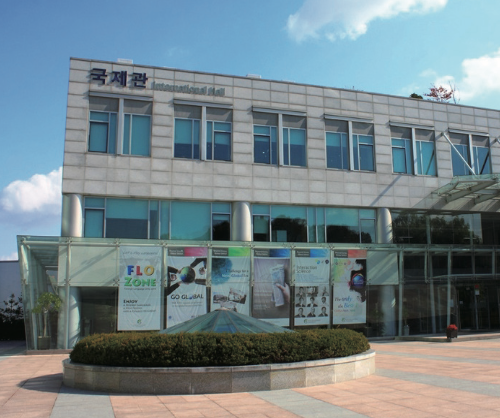Globalization is no longer a trend, but an essential to universities. Sungkyunkwan University (SKKU) is also making efforts such as running language schools and inviting diverse global students and professors to the campus. However, are global programs for Korean students carried out as amicably as they are for international students? Take a look at SKKU’s global programs for Korean students with the Sungkyun Times (SKT).
Universities’ Efforts for Globalization
-Domestic Universities’ Globalization
The history of globalization of Korean universities starts from Baejae Hakdang, which opened in 1885. The evolution of global programs took an extensive boost through the influence of the university student democratization movement in the 1980s. The successful campaign led to the end of military dictatorship in Korea, which also meant the end of resisting foreign influence and the start of globalization. The growing structure of global education in Korea aimed for students’ linguistic, and academic development to spread their talent to the world. These efforts have shown great results so far. During an interview with KU News in 2023, Ben Sowter, the Senior Vice President of global university evaluation agency Quacquarelli Symonds (QS), praised the impressive performance of Korean universities, which are comparable to countries such as Japan or France with much larger populations and markets. Currently, Korean universities are striving to construct global networks between students and professors all over the world as well as plan specific programs to promote global expansion.

-SKKU's Global Programs
The programs SKKU provides for its students can be categorized into two parts: academic and experience- based programs. Academic programs help students mainly develop linguistic capabilities to become global human resources. Freshman students in the department system of SKKU are obliged to take an English Writing course and one of either English Presentation or English Debate courses. Additionally, students must earn at least six credits through general elective lectures classified in the Global area for graduation. Experience-based programs can again be organized into two programs: inbound and outbound programs. Inbound programs target international students who visit SKKU primarily for exchange programs, whereas outbound programs are mainly for domestic students to be sent abroad for global experiences. For outbound program students, SKKU is currently operating 33 double degree courses with renowned international universities, as well as the exchange program and overseas study program. The exchange program and overseas study program dispatch Kingos to foreign universities for a semester or a year, giving them chances to experience different cultures and academic studies by acknowledging the credits the students earn overseas. For credit recognition, the student has to fill out a credit recognition plan paper before the exchange. After the exchange, the student should submit the recognition paper, which must be approved by the head of the department.

Limits of SKKU’s Global Programs
-Academic Programs: Too Theoretical
Primarily, the global academic programs at SKKU lack practicality and diversity, leaving domestic students unprepared for the global market. Many criticize that English Writing, English Presentation, and English Debate courses for freshman students often lack practical content and that the difficulty level of the assignments is considered too low. For instance, the most common assignment given in the English Presentation course is the “English Recipe Presentation.” These assignments are comprised of far too basic materials and assess students through a fragmentary scope. For general elective lectures in the Global area that many seniors take, students can learn more practical content, such as writing English resumes for global corporates or learning the formats of an English language thesis. However, SKKU currently offers a limited choice of English courses. Only three Business English courses and one Career English course were open in the second semester of 2023. “I wanted to take the Career English course to prepare for job applications overseas, but because of the high competition rate to register for the course, I had to take a global general elective course that teaches English literature instead,” said Park Hyuk-jun (Sophomore, Department of Statistics). Furthermore, global major courses vary in number depending on departments, which may provoke unfairness. As of the second semester of 2023, only one global major course out of the 21 major courses opened in the Department of History, whereas 11 out of 59 major courses were taught as global courses in the Department of Economics.
-Exchange Program: Unfriendly and Difficult
Furthermore, the exchange programs contain many deficiencies. The first problem comes from the confusing language certificate notification of SKKU. When applying for exchange students, there are many occasions where requirements of foreign universities, such as certain levels or scores of language certificates, vary between schools and countries. However, the school does not notify the required language exam scores but demands the students to research the required grades on their own. Many students must contact the schools overseas directly or scrutinize their websites, which may sometimes be challenging. The second deficiency lies in the lack of language education programs to prepare the students for the exchange program. In particular, the Natural Sciences Campus (NSC) lacks courses that are non-English, which becomes a large obstacle to NSC students who aim for exchange programs. The Humanities and Social Sciences Campus (HSSC), in the second semester of 2023, has opened four Introduction to French courses; however, the NSC holds none. Finally, there is the issue regarding credit recognition. The criteria for credit recognition are very vague and differ between departments, causing great confusion to students. If a department verifies the plan but rejects a student’s credit recognition paper, the students still cannot achieve any credit for the courses they took overseas.
Solution for Global SKKU
-Expansion of Academic Programs
SKKU should enhance the level and the area of global courses and teach more practical international skills, including cultural aspects, for the globalization of its domestic students. Therefore, global classes for Freshmen, such as English Writing and English Presentation, should be filled with practical, higher-level content for the students to establish their foundation on becoming global human resources. In addition, the school must open more global general elective courses, including courses that provide various opportunities for communication between foreign professors, exchange students, and domestic students. One example would be the lecture at SKKU, Seminar for Experience of Global Culture and Entrepreneurship, where foreign professors and domestic students share their academic and cultural interests. If these types of lectures expand, SKKU could successfully develop new fields for global communication. For this to occur smoothly, SKKU should not limit most international student courses in the International Hall but spread them evenly throughout the campus to create a truly global campus. Global major courses should be held equally throughout departments as well. For this solution to happen, more students must also express their interest in foreign language courses, especially for the change in major courses. Along with SKKU’s academic support, students must follow the given global programs for a more international campus.

-Step by Step Global Program
To solve the deficiencies of the exchange program, SKKU must put more effort into refining the administrative system and educational support. First, the university must notify students regarding the exact language scores required for each foreign university to the students. Since language test results must be uploaded right before being sent to the universities abroad, the Office of International Relations will not be chastened when they announce the requirements after the exchange student assessment. Moreover, SKKU should open more non-English education courses on the NSC so that more students achieve the chance to pursue their studies and careers in non-English speaking countries. Finally, the credit recognition process must be clearer. For instance, each department can open a small information session for students planning to take the exchange program to help students be more aware of the exact criteria. Likewise, the credit recognition process could be altered. The approval of the credit recognition paper could be done before the student returns to SKKU so that if the department decides to reject the foreign lecture’s credits, the student can find another lecture at the foreign university.

The evolution of technology has made the world an extremely small place. Communication across the world has become natural, and therefore, global human resources became essential in the market. For the cultivation of human resources, SKKU puts in hard efforts for global education. What efforts could the Kingos put in? Maybe, reading the SKT could be a good start to begin with!
